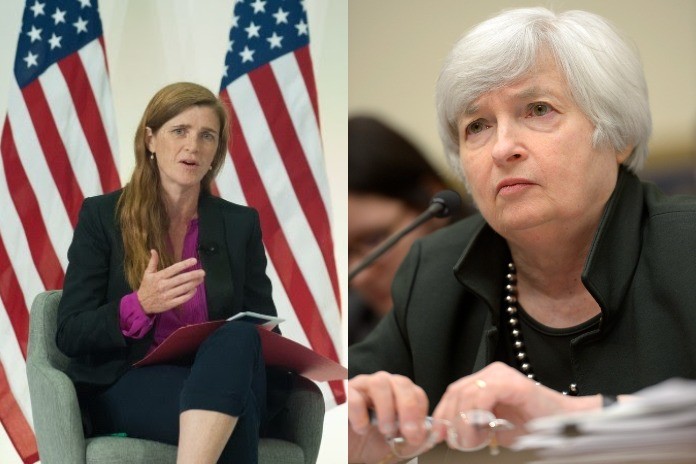By Secretary of the Treasury Janet L. Yellen and USAID Administrator Samantha Power
Just a 30-minute drive from the White House is another estate – a six-bedroom, nine-bathroom mansion outfitted with a movie theater and a seven-car garage. When the home was purchased in 2010, it wasn’t immediately clear who the new owner was. The purchase, according to a civil forfeiture complaint, was made via private trust.
It was only years later that the public learned the buyers behind the trust were Yahya Jammeh, the former president of Gambia, and his wife. Jammeh fled Gambia after committing serious human rights violations and embezzling millions of dollars from his people. He allegedly transformed a portion of that stolen money into several thousand square feet of Potomac, Md., real estate.
Around the world, in countries as varied as Russia, Venezuela and China, the wealthy and the well-connected launder their assets through complex networks of shell companies or transactions involving art, real estate and, occasionally, cryptocurrencies. Sometimes those gains are ill-gotten and sometimes they are legitimately earned but illicitly hidden to evade taxes. But what links all corrupt acts is that they take resources from citizens, undermine public trust and ultimately – threaten the progress of those who fight for democracy.
This week, representatives of more than 100 nations will gather virtually for president Biden’s Summit for Democracy. The gathering is a recognition that the world’s democracies need a new strategy. For the past 15 years, the number of people living under authoritarian regimes has been rising, while leaders of many democratic countries have been chipping away at fundamental rights and checks and balances.
Corruption has made this possible. Autocrats use public wealth to maintain their grip on power, while in democracies, corruption rots free societies from within. Unchecked conflicts of interest and the unequal application of the law erode our trust in common institutions.
The same kleptocrat that the US Agency for International Development helps expose abroad often tries to funnel his money into domestic markets overseen by the US treasury. Indeed, corrupt actors hide their money in the United States all the time. We can no longer provide them a shadow under which to operate.
Combating corruption abroad, therefore, begins at home, and our first step must be to expose the owners of shell companies and other illicit funds. Moving forward, the US government will require many US and foreign companies to report their true owners to the Treasury and to update us when they change hands. We’re also working toward new reporting requirements for real estate transactions and will be enlisting other nations to address these issues.
Second, the United States must be a model for the wider world. The idea of democracy is inseparable from the idea of America, and we cannot support free government abroad if our institutions wither at home. But that is what’s happening.
Last year, for example, more than $600 billion was effectively withheld from U.S. taxpayers disproportionately coming from top earners and large corporations, who take advantage of our broken tax system and get away with evasion. Obviously, there’s a difference between a tax evader and an autocrat who drains the public treasury, but the financial implications are the same. The Treasury needs more resources, including more auditors, to go after evasion, and provisions in the Build Back Better Act will help us do that.
Of course, combating corruption also requires significant efforts abroad, so the United States will deepen and expand support for those fighting kleptocrats and bad actors through a new anti-corruption response fund. In the Dominican Republic, Moldova and Zambia, we’ve seen politicians win landslide victories by running on anti-corruption platforms. We want to support their reforms.
The United States is also increasing its support to media organizations and other watchdogs who risk their lives to expose corruption. These brave activists often play the greatest role in bringing down dictatorships, because while corruption may fuel autocracies, it can also be their Achilles’ heel. In 2019, a record year for global mass protests, roughly half were driven by exposed corruption, six of which led to changes in government.
We will also seek to protect international journalists from lawsuits – the latest tactics of oligarchs and autocrats seeking to suppress stories exposing corruption. USAID is launching a global Defamation Defense Fund to offer journalists coverage to survive defamation claims and deter suits in the first place.
Finally, because the government doesn’t have a monopoly on good ideas, USAID will work with civil-society and private-sector partners to crowdsource new tools and technologies to stop corrupt officials from plundering their countries’ resources and transferring them across borders.
These steps, part of the new U.S. Strategy on Countering Corruption, will embolden good-government activists, shine a light on dark corners of the global financial system, bring in more tax dollars for the public benefit and prevent criminals from laundering money through the US and international financial systems.
There may always be some level of corruption, public officials on the take or illicit dollars flowing through our economy. But to uphold democracy, we must strive to make those acts difficult and rare – not easy and common.
Previously published in The Washington Post, December 6, 2021 – Janet L. Yellen and Samantha Power: To uphold democracy, the U.S. must fight global corruption





